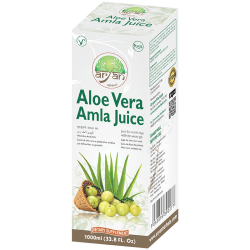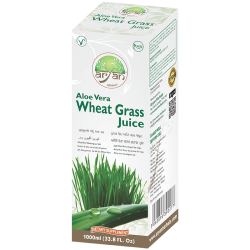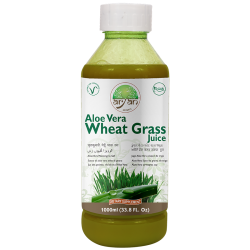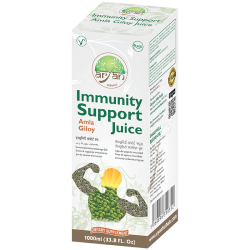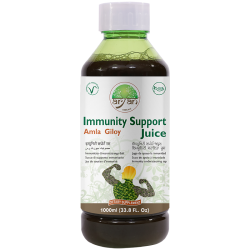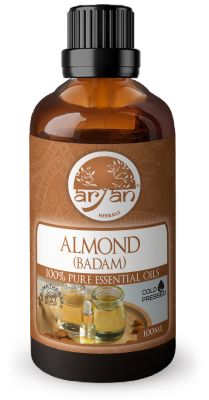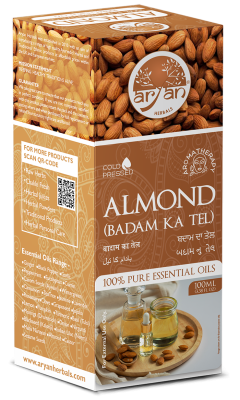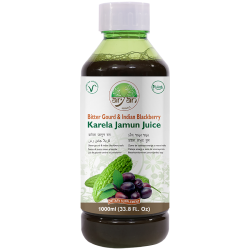Description
The word Aloe is derived from the Arabic word ‘Alloeh’, which means shiny and bitter. For thousands of years, people have recognized the healing and moisturizing properties of the Aloe Vera plant. Traditionally, it’s believed to help maintain & promote digestion, a healthy immune system and a healthy skin. Additionally, though its taste is sour, bitter and astringent and its quite fibrous. Indian Gooseberry (amla) is known to be rich in Vitamin C and full of powerful antioxidants and believed to have various health benefits.
Botanical Name(s):
Aloe Barbadensis Miller, Emblica officinalis
Traditionally known benefits of this herb:
- Believed to help maintain vitality.
- Believed to help promote healthy skin.
- Believed to help maintain & promote digestion.
- Believed to help maintain a healthy immune system.
Dosage: 20 ml. twice a day before food.
- New
Description
The word Aloe is derived from the Arabic word ‘Alloeh’, which means shiny and bitter. For thousands of years, people have recognized the healing and moisturizing properties of the Aloe Vera Plant. Traditionally, it’s believed to help maintain & promote digestion, a healthy immune system and a healthy skin. Additionally, Wheatgrass is known to be a natural detoxifier of liver and a blood protector. The enzymes and amino acids found in wheatgrass are widely believed to help protect us from carcinogens and act as an anti-pollutant, stimulating metabolism, regulating blood pressure and enriching the blood.
Traditionally known benefits of this herb:
- Believed to help increases Hemoglobin in blood.
- Believed to help maintain & promote digestion.
- Believed to help maintain a healthy immune system.
- Believed to help maintain a healthy weight and maintain a healthy skin.
- Believed to help detoxification of blood, resolves foul odors of breath and sweat.
- New
Description
Amla is one of the valuable gift of nature to mankind for body fitness. The plum‐sized fruit grows on a small leafy bush that has a strong lemon scent. Though its taste is sour, bitter and astringent and its quite fibrous. Indian Gooseberry (amla) is known to be rich in Vitamin C and full of powerful antioxidants and believed to have various health benefits.
“Giloy (Tinospora Cordifolia) is an Ayurvedic herb that has been used and advocated in Indian medicine for ages”
Botanical Name(s): Emblica officinalis, Tinospora Cordifolia
Popular Name(s): Amla (Indian Gooseberry), Giloy/ Guduchi (Heart-leaved moonseed)
Dosage: 30 ml. twice a day before food.
- New
Description
- Aryan Herbals 100% Pure Essential Oil, High Potency Aromatherapy, Natural Undiluted Oil for Relaxing Therapeutic Massage, Skin Treatments, Aroma Diffusers, Hair Growth, Muscle & Joints (Almond)
- Almond Essential Oil – Pure, Natural, Therapeutics Grade and Undiluted oil.
- Rich in nutrients.
- Believed to be an essential nutrient source for the brain and nervous system.
- Used in some cultures to improve complexion and skin tone.
- May help reduce the appearance of scars.
- New
Description
Though it has a rigid surface and is bitter in taste, bitter melon is believed to have a host of medicinal properties including helping with balancing and regulating blood sugar level. Additionally, the juicy pulp of Jamun/ Jambo fruit contains resin, Gallic acid and tannin and the taste can vary from acidic to fairly sweet. The Jamun seed is known to contain a biochemical called ‘jambolin’ and glycoside, which is believed to check the conversion of starch into sugar. It is also a rich source of vitamins A & C. Popular name(s): Jambul, Jamun, Black Plum, Faux Pistachier, Indian Blackberry, Jambol, Doowet and Jambolan. “The fruit of the tree are very tasteful; one who regularly consumes the juice of the jambu tree, does not suffer from old age, disease and can even resist death…” Vayu puran, Chapter 46, Verse 28/29.
Botanical Name:
Momordica charantia, Syzygium cumini
Traditionally known benefits of this herb:
- Believed to help promote digestion.
- Believed to help healing skin related ailments.
- Believed to help maintain healthy digestion.
- Believed to help maintain body temperature.
- Believed to help maintain normal blood pressure.
- Believed to help maintain sugar level in blood which is already in normal range.
Dosage: 30 ml. twice a day before food.
- New



